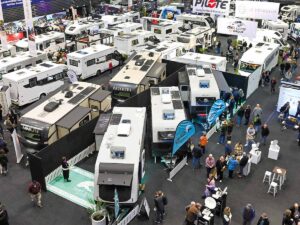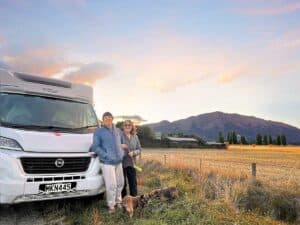“I just couldn’t believe it,” he tells us. “My neighbour heard a couple of people yelling early in the morning before driving off with it, but she just assumed it was me.”
John, who had owned the caravan for 10 years, believes the daring thieves had probably scoped out his caravan and had taken advantage of the fact that he’d removed his towball lock for a short period. “I’d taken the lock off two days prior to take the caravan for a WOF and brake check, but I’d forgotten to put it back on,” he says.
It was a similar story for Michael Fletcher, whose rare 1979 Concord caravan was stolen from his Auckland property overnight. Having put considerable work into restoring it,
the caravan was his pride and joy. In each case, the owners were left gobsmacked that anyone could be so brazen as to hitch up their caravan in the middle of the night and drive off with it.
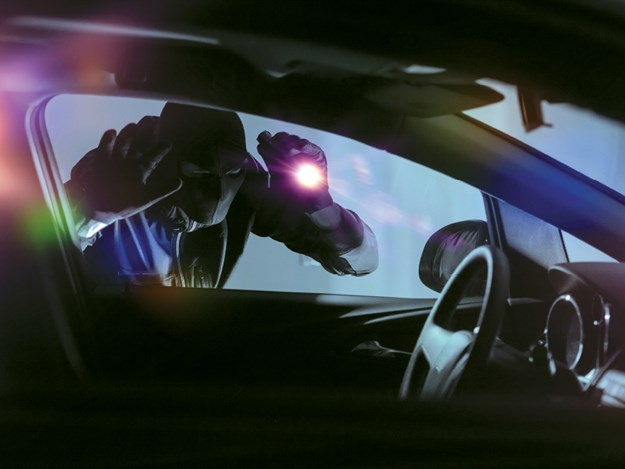 Unfortunately, caravan thefts are not uncommon. If you’re a member of any motorhoming group on Facebook, you’ve undoubtedly seen a number of posts recently from distraught owners hoping to recover their stolen caravan or campervan.
Your caravan or motorhome is a considerable investment, as is your gear inside. So you’ll no doubt want to do everything possible to keep it safe and secure. We’ve put together some helpful tips to help ensure your RV and everything in it (including you!) stays safe as houses.
Unfortunately, caravan thefts are not uncommon. If you’re a member of any motorhoming group on Facebook, you’ve undoubtedly seen a number of posts recently from distraught owners hoping to recover their stolen caravan or campervan.
Your caravan or motorhome is a considerable investment, as is your gear inside. So you’ll no doubt want to do everything possible to keep it safe and secure. We’ve put together some helpful tips to help ensure your RV and everything in it (including you!) stays safe as houses.
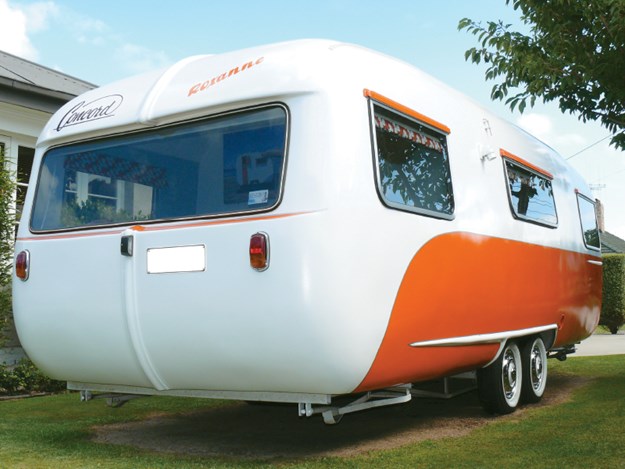 “It’s a good idea to choose a vehicle that not easily broken into and that has sufficient storage (internal as well as external such as a large boot) for anything you need secured,” he says. “Small, hip vans may be cheaper and seem fun, but they may also be harder to hide valuables in and be easier to break into.”
Another tip from TJ is for rental travellers to look less like tourists and more like locals, including travelling in a campervan that isn’t overly branded. “Thieves are less likely to target people who look like locals, as their gear isn’t as appealing as tourists,” he says.
“It’s a good idea to choose a vehicle that not easily broken into and that has sufficient storage (internal as well as external such as a large boot) for anything you need secured,” he says. “Small, hip vans may be cheaper and seem fun, but they may also be harder to hide valuables in and be easier to break into.”
Another tip from TJ is for rental travellers to look less like tourists and more like locals, including travelling in a campervan that isn’t overly branded. “Thieves are less likely to target people who look like locals, as their gear isn’t as appealing as tourists,” he says.
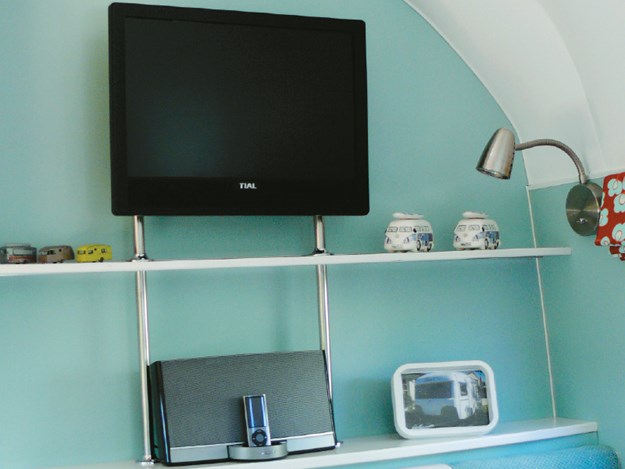


 Also, remember to lock up your vehicle before going to sleep, and check for any tripping obstacles that might be a hazard if you get up during the night.
A foghorn, personal alarm, or door/window alarm system are all options worth looking into, especially if travelling alone. Seasoned travel writer Jill Malcolm says that she’s always had a foghorn in her caravan, although has never once had to use it.
Milenco has a battery-powered alarm system specifically designed to protect you while you’re in your RV. The system has individual alarms, which can be used to protect all vulnerable doors and windows in your motorhome or caravan. They also feature flashing LED lights to deter would-be attackers. We understand this system will soon be available from the New Zealand distributor for Milenco, RV & Marine Supplies in Hamilton.
Also, remember to lock up your vehicle before going to sleep, and check for any tripping obstacles that might be a hazard if you get up during the night.
A foghorn, personal alarm, or door/window alarm system are all options worth looking into, especially if travelling alone. Seasoned travel writer Jill Malcolm says that she’s always had a foghorn in her caravan, although has never once had to use it.
Milenco has a battery-powered alarm system specifically designed to protect you while you’re in your RV. The system has individual alarms, which can be used to protect all vulnerable doors and windows in your motorhome or caravan. They also feature flashing LED lights to deter would-be attackers. We understand this system will soon be available from the New Zealand distributor for Milenco, RV & Marine Supplies in Hamilton.
 Unfortunately, caravan thefts are not uncommon. If you’re a member of any motorhoming group on Facebook, you’ve undoubtedly seen a number of posts recently from distraught owners hoping to recover their stolen caravan or campervan.
Your caravan or motorhome is a considerable investment, as is your gear inside. So you’ll no doubt want to do everything possible to keep it safe and secure. We’ve put together some helpful tips to help ensure your RV and everything in it (including you!) stays safe as houses.
Unfortunately, caravan thefts are not uncommon. If you’re a member of any motorhoming group on Facebook, you’ve undoubtedly seen a number of posts recently from distraught owners hoping to recover their stolen caravan or campervan.
Your caravan or motorhome is a considerable investment, as is your gear inside. So you’ll no doubt want to do everything possible to keep it safe and secure. We’ve put together some helpful tips to help ensure your RV and everything in it (including you!) stays safe as houses.
DON’T TEMPT FATE
If you’re locking up and heading off for a while during your travels, ensure your valuables are out of sight. In fact, even when you’re in your motorhome, it’s wise to keep handbags, laptops, and other theft-worthy items well hidden. But beware of simply covering items over; a cord emerging from beneath a jacket or towel is a dead giveaway to thieves that something valuable is hidden beneath. TJ Tingson, adventure support manager at Wilderness Motorhomes, suggests that those hiring a campervan consider their rental vehicle carefully. “It’s a good idea to choose a vehicle that not easily broken into and that has sufficient storage (internal as well as external such as a large boot) for anything you need secured,” he says. “Small, hip vans may be cheaper and seem fun, but they may also be harder to hide valuables in and be easier to break into.”
Another tip from TJ is for rental travellers to look less like tourists and more like locals, including travelling in a campervan that isn’t overly branded. “Thieves are less likely to target people who look like locals, as their gear isn’t as appealing as tourists,” he says.
“It’s a good idea to choose a vehicle that not easily broken into and that has sufficient storage (internal as well as external such as a large boot) for anything you need secured,” he says. “Small, hip vans may be cheaper and seem fun, but they may also be harder to hide valuables in and be easier to break into.”
Another tip from TJ is for rental travellers to look less like tourists and more like locals, including travelling in a campervan that isn’t overly branded. “Thieves are less likely to target people who look like locals, as their gear isn’t as appealing as tourists,” he says.
UNDER LOCK AND KEY
Most new motorhomes and caravans now come with high-quality security doors and windows, but if your RV’s latches are less than secure, it’s well worth investing in new hardware. If your door needs extra security, a wall-mounted sliding door lock is a good option for doors, lockers, and garages. These are fast and easy to install yourself and are available from most RV accessory stores. Always carry your keys with you rather than hiding them somewhere around your vehicle and be sure to have a spare set (perhaps kept at home or with a family member).
WITHOUT A HITCH
Both John McDonald and Michael Fletcher’s caravans were likely stolen not by opportunistic thieves but by someone who had every intention of stealing a caravan and, therefore, was looking for one that was not secured and could be simply hitched up quickly and driven off with. And it happens time and time again. In fact, just last year, a Petone man had his caravan stolen while he slept inside. The shocked owner—who initially thought he was the target of a practical joke—was fortunate enough to have his mobile phone on him and was able to alert police who intercepted the thief (who was quite unaware the caravan was occupied!). There are a couple of solutions to the problem of caravan crooks, and a good start is a hitch lock. A hitch lock does exactly that—locks the caravan hitch so it can’t be towed away. The lock fits over the towball, encasing it completely and preventing any would-be thieves from hitching up your prized possession. Another good option is a wheel clamp. For less than $200, they’re a great deterrent. Any thief who sees a clamp attached is likely to simply move on to an easier target. If your caravan or motorhome is parked up at home, a secure gate will go a long way to keeping thieves at bay. If this isn’t possible, another option worth looking into is having a security bollard installed. Commonly seen along shop fronts, these provide a physical (but removable) barrier, preventing your caravan from being moved from your driveway.THAT’S ALARMING
Just as with your home, an alarm for your caravan or motorhome will deter thieves and alert others to any dodgy goings-on. Most late model motorhomes include an alarm system and/or an isolator switch. Some of the new alarms now available can be operated and monitored remotely from your smartphone. But be sure to do your homework and use a trusted alarm installer. You don’t want to be that person in the campground whose alarm is always going off. Another cheap and easy option for caravans parked up at home or at the bach is to have solar-powered sensor lights installed near the door. You may also like to consider having a GPS tracker in your vehicle. There are a number of these now available on the market, which can be linked to an app on your smartphone, allowing you to track your vehicle (or anything else for that matter) if it is stolen.
NEIGHBOURHOOD WATCH
Getting to know your neighbours—both at home and at campsite stays—is a vital tool in your security toolkit. Ask neighbours that you’ve established a level of trust with to keep an eye out when you’re away. Swap phone numbers so you each have someone nearby to call if needed, or just to keep each other informed on suspicious activities. A few extra alert eyes and ears on your RV could save a whole lot of heartache.SOCIAL MEDIA
There are some fantastic groups and pages on Facebook and other social media that allow motorhomers and caravanners to keep in touch, arrange gatherings, and share great tips and advice. But do be careful posting details about when you’ll be away from home or your travel itinerary. There are some unscrupulous characters, who might be very interested in the fact that you’re staying in a certain campground and planning to head out to try the new restaurant up the road tonight! It may be a better idea to post those great travel shots and share stories of where you’ve been once you’re back home.PROTECT YOUR POSSESSIONS
The unfortunate fact is that the stolen caravans mentioned earlier are unlikely to be recovered. “My guess is that one day a tramper will find it abandoned in the bush somewhere!” John McDonald says. Fortunately, though, he did have it insured and will receive a full pay-out soon. Insuring your caravan or motorhome from the day you take possession of it is imperative. There are two insurance companies in New Zealand who specialise in motorhome and caravan insurance—Covi and Camper Care. As with any insurance, it’s worth doing your homework and using the provider that best meets your needs. John suggests checking whether your insurance includes contents. “I hadn’t realised that my policy excluded contents. It’s something I didn’t think to check, and wish I had.” If you’re travelling with devices such as laptops, tablets, and phones, it’s a good idea to make sure they’re well secured with passwords. You may also like to ensure you’ve got updated photos and have noted down serial numbers of your valuables. And if they don’t have serial numbers, there are etching/engraving services who can do this for you. You can also register items on the New Zealand Police SNAP website (snap.org.nz). This free website lets you enter and maintain details of any valuable assets or possessions. If your items are stolen, you can instantly access your list details and forward them on to the Police and your insurance company.
DETECTING TROUBLE
Another important part of your personal security and safety toolkit should be smoke alarms and carbon monoxide detectors. Carbon monoxide detectors detect the presence of carbon monoxide (which is completely odourless and invisible)—a by-product of incomplete combustion, which can be produced when fuel-burning appliances, including LPG burners develop an undetected fault. Many new RVs include detectors, but if you need to purchase one, they are relatively inexpensive and potentially lifesaving. It’s also a good idea to keep a fire extinguisher on-board and ensure you’re familiar with how to use it. Hopefully, you’ll never need it, but you certainly wouldn’t want to be without one if you do.PERSONAL PROTECTION
We’ve covered off a few tips to help keep your caravan or motorhome safe, but just as important is your personal safety. If you’re freedom camping or not using a campground, it’s still a good idea to try and park nearby other campers. Advice from the New Zealand Police is to always park in well-lit areas and avoid being isolated. It’s also wise to park so that you can drive away quickly if needed without worrying about reversing or turning around. These days, most of us travel with a smartphone, but be sure to always keep it well charged and ensure it is topped up with credit. A simple tracking app on your phone is also a good idea. This way, friends or family (that you nominate) can see where you are (provided your mobile data and GPS are both switched on). Also, remember to lock up your vehicle before going to sleep, and check for any tripping obstacles that might be a hazard if you get up during the night.
A foghorn, personal alarm, or door/window alarm system are all options worth looking into, especially if travelling alone. Seasoned travel writer Jill Malcolm says that she’s always had a foghorn in her caravan, although has never once had to use it.
Milenco has a battery-powered alarm system specifically designed to protect you while you’re in your RV. The system has individual alarms, which can be used to protect all vulnerable doors and windows in your motorhome or caravan. They also feature flashing LED lights to deter would-be attackers. We understand this system will soon be available from the New Zealand distributor for Milenco, RV & Marine Supplies in Hamilton.
Also, remember to lock up your vehicle before going to sleep, and check for any tripping obstacles that might be a hazard if you get up during the night.
A foghorn, personal alarm, or door/window alarm system are all options worth looking into, especially if travelling alone. Seasoned travel writer Jill Malcolm says that she’s always had a foghorn in her caravan, although has never once had to use it.
Milenco has a battery-powered alarm system specifically designed to protect you while you’re in your RV. The system has individual alarms, which can be used to protect all vulnerable doors and windows in your motorhome or caravan. They also feature flashing LED lights to deter would-be attackers. We understand this system will soon be available from the New Zealand distributor for Milenco, RV & Marine Supplies in Hamilton.
For more info:
- For further safety and security advice, or advice on reporting a crime, visit police.govt.nz
- To create and store an asset list online, visit snap.org.nz
- To check whether a vehicle has been reported stolen, visit police.govt.nz/stolenwanted/stolen-vehicles
- For more information about online safety, visit netsafe.org.nz
- To find out more about some of the products mentioned in this article, see our New & Noteworthy feature

